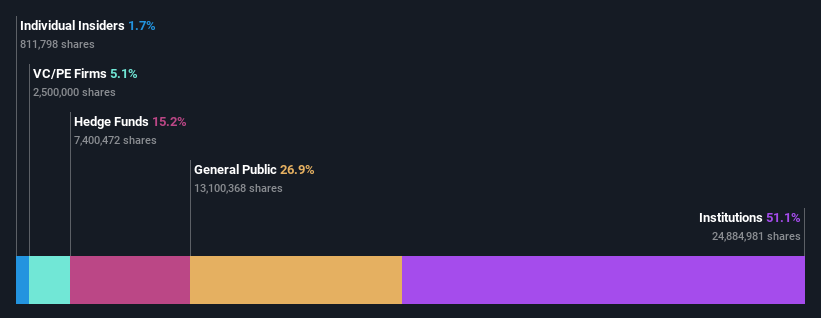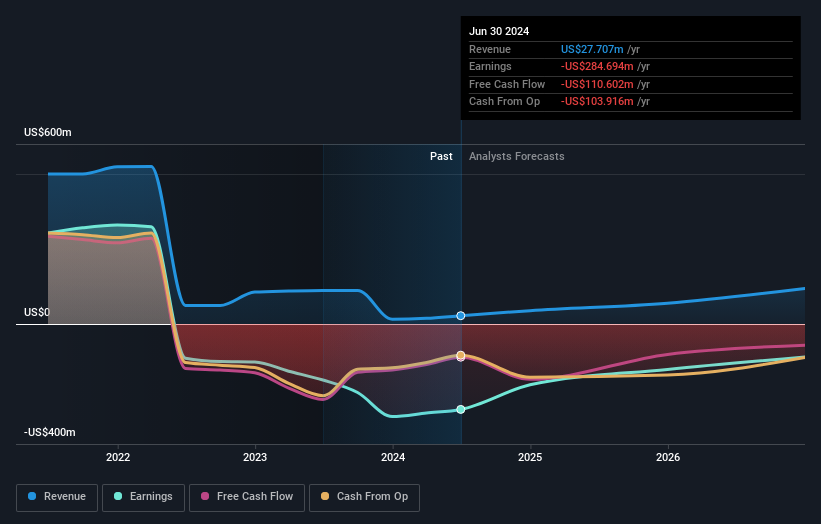- United States
- /
- Biotech
- /
- NasdaqGS:QURE
Institutional owners may take dramatic actions as uniQure N.V.'s (NASDAQ:QURE) recent 11% drop adds to one-year losses

Key Insights
- Significantly high institutional ownership implies uniQure's stock price is sensitive to their trading actions
- 50% of the business is held by the top 17 shareholders
- Insiders have been selling lately
A look at the shareholders of uniQure N.V. (NASDAQ:QURE) can tell us which group is most powerful. We can see that institutions own the lion's share in the company with 51% ownership. That is, the group stands to benefit the most if the stock rises (or lose the most if there is a downturn).
And so it follows that institutional investors was the group most impacted after the company's market cap fell to US$271m last week after a 11% drop in the share price. This set of investors may especially be concerned about the current loss, which adds to a one-year loss of 31% for shareholders. Often called “market movers", institutions wield significant power in influencing the price dynamics of any stock. As a result, if the downtrend continues, institutions may face pressures to sell uniQure, which might have negative implications on individual investors.
Let's delve deeper into each type of owner of uniQure, beginning with the chart below.
Check out our latest analysis for uniQure

What Does The Institutional Ownership Tell Us About uniQure?
Institutional investors commonly compare their own returns to the returns of a commonly followed index. So they generally do consider buying larger companies that are included in the relevant benchmark index.
We can see that uniQure does have institutional investors; and they hold a good portion of the company's stock. This implies the analysts working for those institutions have looked at the stock and they like it. But just like anyone else, they could be wrong. It is not uncommon to see a big share price drop if two large institutional investors try to sell out of a stock at the same time. So it is worth checking the past earnings trajectory of uniQure, (below). Of course, keep in mind that there are other factors to consider, too.

Institutional investors own over 50% of the company, so together than can probably strongly influence board decisions. Our data indicates that hedge funds own 15% of uniQure. That catches my attention because hedge funds sometimes try to influence management, or bring about changes that will create near term value for shareholders. Our data shows that Vestal Point Capital, LP is the largest shareholder with 9.8% of shares outstanding. With 5.4% and 5.1% of the shares outstanding respectively, Nantahala Capital Management, LLC and Tavistock Life Sciences are the second and third largest shareholders. Furthermore, CEO Matthew Kapusta is the owner of 0.7% of the company's shares.
After doing some more digging, we found that the top 17 have the combined ownership of 50% in the company, suggesting that no single shareholder has significant control over the company.
While it makes sense to study institutional ownership data for a company, it also makes sense to study analyst sentiments to know which way the wind is blowing. Quite a few analysts cover the stock, so you could look into forecast growth quite easily.
Insider Ownership Of uniQure
While the precise definition of an insider can be subjective, almost everyone considers board members to be insiders. Management ultimately answers to the board. However, it is not uncommon for managers to be executive board members, especially if they are a founder or the CEO.
Insider ownership is positive when it signals leadership are thinking like the true owners of the company. However, high insider ownership can also give immense power to a small group within the company. This can be negative in some circumstances.
We can report that insiders do own shares in uniQure N.V.. In their own names, insiders own US$4.5m worth of stock in the US$271m company. It is good to see some investment by insiders, but it might be worth checking if those insiders have been buying.
General Public Ownership
With a 27% ownership, the general public, mostly comprising of individual investors, have some degree of sway over uniQure. While this size of ownership may not be enough to sway a policy decision in their favour, they can still make a collective impact on company policies.
Private Equity Ownership
Private equity firms hold a 5.1% stake in uniQure. This suggests they can be influential in key policy decisions. Some investors might be encouraged by this, since private equity are sometimes able to encourage strategies that help the market see the value in the company. Alternatively, those holders might be exiting the investment after taking it public.
Next Steps:
It's always worth thinking about the different groups who own shares in a company. But to understand uniQure better, we need to consider many other factors. For example, we've discovered 4 warning signs for uniQure (1 makes us a bit uncomfortable!) that you should be aware of before investing here.
Ultimately the future is most important. You can access this free report on analyst forecasts for the company.
NB: Figures in this article are calculated using data from the last twelve months, which refer to the 12-month period ending on the last date of the month the financial statement is dated. This may not be consistent with full year annual report figures.
Valuation is complex, but we're here to simplify it.
Discover if uniQure might be undervalued or overvalued with our detailed analysis, featuring fair value estimates, potential risks, dividends, insider trades, and its financial condition.
Access Free AnalysisHave feedback on this article? Concerned about the content? Get in touch with us directly. Alternatively, email editorial-team (at) simplywallst.com.
This article by Simply Wall St is general in nature. We provide commentary based on historical data and analyst forecasts only using an unbiased methodology and our articles are not intended to be financial advice. It does not constitute a recommendation to buy or sell any stock, and does not take account of your objectives, or your financial situation. We aim to bring you long-term focused analysis driven by fundamental data. Note that our analysis may not factor in the latest price-sensitive company announcements or qualitative material. Simply Wall St has no position in any stocks mentioned.
About NasdaqGS:QURE
uniQure
Develops treatments for patients suffering from rare and other devastating diseases.
Good value with limited growth.


